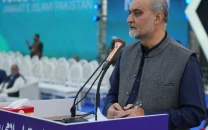Enforced disappearance case: IHC seeks reply from govt’s top lawyer
Petitioner’s counsel claims several detainees languishing in internment centres

PHOTO: IHC WEBSITE
A local court on Monday issued a notice to the top government lawyer in a petition challenging the regulations that empower security agencies to detain suspected terrorists in internment centres.
The Islamabad High Court (IHC) judge Aamer Farooq issued the notice to the Attorney General of Pakistan (AGP) in the petition challenging The Actions (in Aid of Civil Power) Regulations, 2011, in an enforced disappearance case.
The court was informed that several citizens have been kept in what the petitioner called Guantanamo Bay prison-like “internment centres”.
The petitioner, Saifal Khan, 75, who hails from Multan, through his counsel Barrister Shahzad Akbar has challenged the regulations in connection with the case of his missing son, Abdul Aziz. He has made the Federation, defence ministry, the president, Ministry of States and Frontier Regions and internment authority under Regulation 8 of the Actions (in Aid of Civil Power) Regulations, 2015, respondents in the case.
Aziz, a daily-wage labourer, was picked up by agencies from the premises of the Sessions Court in Karachi on the 13th of January 2010.
The counsel informed the court that the regulations that were challenged provided legal cover to a network of prisons set up in the settled districts of the Khyber-Pakhtunkhwa (K-P) where hundreds of citizens from all over the country had been kept.
“The prisons known as “internment centres” are modelled exactly along the lines of US prison in Guantanamo Bay, Cuba,” he stated.
Akbar informed the court that Aziz remained a “missing person” until 2012 when an additional secretary of the interior ministry disclosed before the Missing Persons’ Commission that he was being detained at an internment centre in Lakki Marwat.
The counsel added that six years after Aziz was first picked, he remained in state custody even though he had never been tried or convicted by any court of law.
Reportedly, he said, Aziz’s health was also failing.
Akbar said that the regulations were formulated in a very questionable manner.
He said that the regulations were promulgated by the President under Article 247 of the Constitution, which gave him the narrow powers to make laws specific to Fata only.
However, Akbar said, the scope of regulations was beyond Fata. A number of detainees hailed from outside Fata. Like the petitioner, Akbar added, most of them were from the Punjab.
Likewise, he added, the “internment centres” were physically located outside Fata, in places all over K-P such as Lakki Marwat and Kohat.
Akbar told The Express Tribune that regulations were signed by former President Asif Zardari.
He said that the application of the regulations was limited to Fata but people had been picked up from all parts of the country. Akbar said that similarly the internment centres were set up in various parts of the country in violation of the regulations.
Moreover, Akbar informed the court that the regulations ran afoul of the Constitution because they blatantly infringed upon the fundamental right of due process.
The petitioner has also prayed that compensation may be paid to the detainees.
Published in The Express Tribune, February 2nd, 2016.



















COMMENTS
Comments are moderated and generally will be posted if they are on-topic and not abusive.
For more information, please see our Comments FAQ